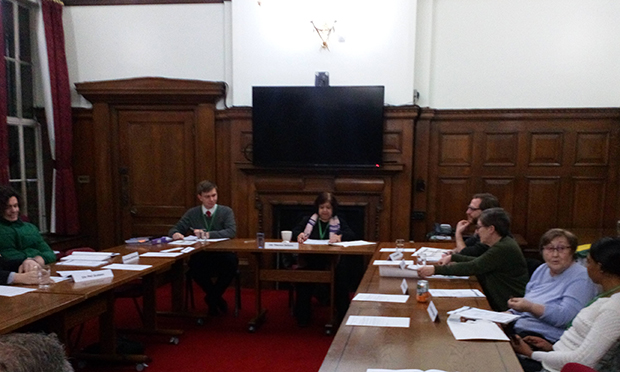Sharp rise in school exclusions under the microscope in Islington

Islington Children’s Services Scrutiny Committee, 10 January. Photograph: Ed Sheridan.
Islington Council is conducting a wide-ranging review in search of answers to the dramatic rise in school exclusions across the borough in 2016/17.
Permanent exclusions for ‘persistent disruptive behaviour’ rose by 50 per cent in the year in Islington, as against a national rise of 19 per cent.
The borough’s own overall exclusion rate rose from 0.12 per cent to 0.14 per cent, with 0.04 per cent of this rise accounted for by one school, with a national rise from 0.08 per cent in 2015/16 to 0.10 per cent in 2016/17.
Cllr Phil Graham (Lab, Bunhill), said: “When you get exclusions, either temporary or permanent, it hangs over these kids. You can have such a disrupted school life that you get no college education. It follows on, not just at school level.
“They’re not going to do well in their exams, because their needs haven’t been taken care of.
“If someone does a crime, one of the first things that they do is have a psychological report before they sentence. Before anyone’s excluded, they should be tested for neurodivergence or ADHD.”
Cllr Graham went on to point to the fact that, according to the report, exclusions tend to peak in Year 10, suggesting a link with exam results.
Candy Holder, Islington’s head of pupil services, said: “Remember that we’re talking about a large number exclusions across a small number of schools rather than across all of our schools, so just to reinforce that.
“Only two per cent of headteachers surveyed said that they received enough money for children with special educational needs.
“Clearly there is a view out there that resources are simply not adequate for the job, as needs are expanding. So that is a real challenge.
“We all thought we’d been given a nice Christmas present by the government when they announced more money for special educational needs, and that was money they’d already given us.
“There’s lots of sleight of hand going on to make it look like the situation’s improving – it’s not and that’s the reality.”
Holder’s review identified five possible reasons for an increase in exclusions.
As well as a lack of schools funding and an increasingly non-arts or technical focussed curriculum, the review points towards a shift in disciplinary techniques such as “zero tolerance” policies.
Some schools also stand accused of using exclusions to game the system and increase their standing in league tables.
The review also draws attention to an environment in which schools are increasingly encouraged to compete against each other.
Holder added: “There’s a sixth factor for me – is childhood simply becoming too difficult?
“I think you have to ask that question, because what we are seeing is more and more children who are withdrawing themselves from life, which concerns us greatly.”
